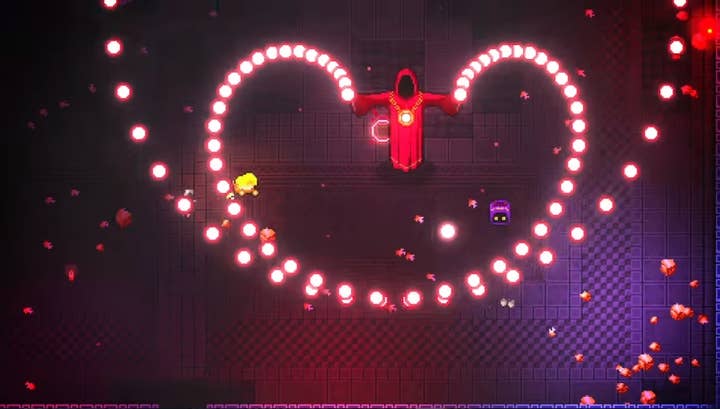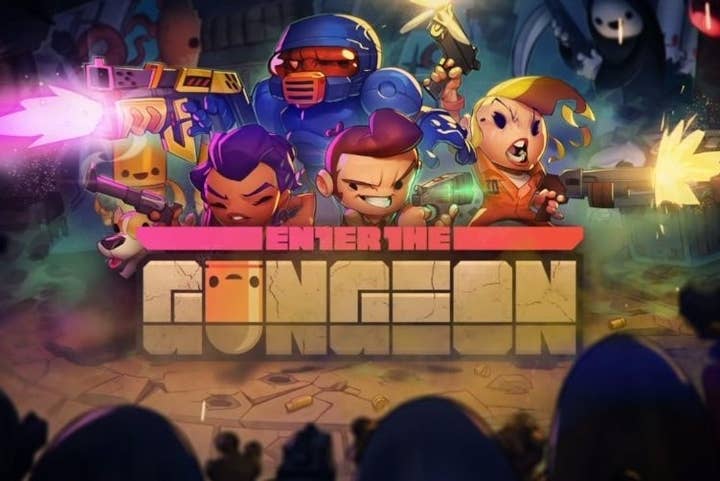Dodge Roll's speedrun to indie success
Enter the Gungeon developer Dave Crooks explains how his studio went from formation to signing with Devolver in a matter of weeks and launching a hit in under two years
In 2014, Dave Crooks and some of his co-workers at Dungeon Keeper developer EA Mythic saw the writing on the wall for the studio and were planning to go indie. They'd started saving and were planning to make the jump at the end of the summer, but as Crooks told GamesIndustry.biz, "EA did what it does and closed Mythic down" that May.
"Since we were ready to go and start our own thing mentally, when the call came in that Mythic was shutting down, we just looked at each other and said, 'Ok. Let's take like four days off, and then start working immediately,'" Crooks said.
It was not the first time that something at Dodge Roll happened on an accelerated timeline. News of Mythic's closure came out on May 29. Crooks and his co-founders wanted to have something to shop around at E3 2014, which kicked off June 10. Fortunately, the key elements of Enter the Gungeon came together quickly, with the prototype combining the game's bullet hell and invincible dodge roll elements arising in an afternoon.
"When we were coming out, the amount of copies we had to sell to break even would be considered a success for many indie games. And that was really scary."
When the show rolled around, Crooks flew out to LA with a build of the game on a laptop in his backpack. He didn't have a badge for the show, or an appointment with the team's preferred publisher, Devolver. Fortunately, Devolver had set up its E3 presence just off-site, in a parking lot behind a Hooters near the Los Angeles Convention Center, so he wouldn't need a badge to hang around and catch someone's eye. As Crooks described it, Devolver's Nigel Lowrie eventually humored him and heard the Enter the Gungeon pitch. A week after the show, Devolver made them an offer.
"The indie landscape has been changing pretty rapidly, and while Greenlight was getting bigger two years ago, being signed with Devolver at the time was like, 'Oh my god, as long as we deliver a halfway decent game we're going to be ok. Maybe we'll be able to make another game,'" Crooks said.
That solace wouldn't last especially long. As the indie scene--and the situation for indie games on Steam--continued to shift, the worries grew. The number of high quality pixel-art roguelikes on the market multiplied, development dragged on almost a year longer than expected, and each passing week meant more competition on Steam and Dodge Roll going deeper in debt. Crooks was confident the game would be good, but he knew that wouldn't guarantee success.
"It was more that we were very afraid of the marketing, of trying to get noticed and find our audience," Crooks said. "Because I play absolutely everything I can, and there are a bunch of games I play on Steam that are totally excellent, but unfortunately have not been nearly as successful as Gungeon has. And that instilled a great deal of fear in us. We always knew having Devolver would help us some amount, but it's so hard to quantify... When we were coming out, the amount of copies we had to sell to break even would be considered a success for many indie games. And that was really scary."

Enter the Gungeon launched on the PC and PlayStation 4 last month. Like so much else with the game, success happened faster than expected, selling 200,000 copies in its first week.
While Dodge Roll is continuing to work on additional content for the game, Crooks had already pulled some lessons from the experience. First, never announce a release date until you're absolutely sure. Second, bringing a PC game to consoles is a non-trivial task.
"[D]eveloping a game for a console, going through the certification process, making sure everything is optimized is just a way, way bigger endeavor than we realized."
"We absolutely did not know what we were getting into," Crooks confessed. "We built the game in Unity, Unity compiles in PlayStation 4, and we had PS4 dev kits. Initially there was a sense that we can totally do the port ourselves and it's not going to take us much time at all. But by the end of the game, we contracted a porting team, 22nd Century Toys in Austin, and they were super great, but we worked with them for four or five months pretty closely. It was an expensive endeavor, and it took a great deal more time than we had anticipated.
"So I think going into the next game, we realize that developing a game for a console, going through the certification process, making sure everything is optimized is just a way, way bigger endeavor than we realized. I'm not saying we wouldn't necessarily do that again, but we would definitely plan to basically tack six months onto the development of the game to do it."
As for lessons he would feel confident passing on to other aspiring developers, Crook had a few.
"One of the first things that comes to mind is, 'Do you have any friends that live in Canada?' Because starting a small business in the United States, especially with gaming, if you're not going the Kickstarter route, or not lucky enough to find a good publisher quickly, you're going to be milling your own savings. When I talk to a lot of developers from other countries that are able to get grants because some majority of the team is from a country that will give a grant, I think that's a super viable way to go. And sometimes we get jealous of the programs that are in place in other countries."
He also stressed the need to keep the team as small as possible and work with the right people, because higher headcount makes it that much harder for a studio to survive making anything short of a hit. It's great if those people are your friends, but it's more important that they are the best possible people to put a professional product together. Finally, Crooks emphasized the need for having a solid plan from the outset.
"We definitely didn't plan our game as well as I think we will every time in the future. And it cost us a lot of mental health and having to make up for it in crunch."
"We definitely didn't plan our game as well as I think we will every time in the future. And it cost us a lot of mental health and having to make up for it in crunch," Crooks said. "There's this rule around doing pretty much anything in games--and other disciplines as well--that says, 'Take whatever amount of time you think it's going to take and then times it by three.' I've heard that a million times, and when I heard it on our game, I was like, 'Yeah, but we're going to be faster.' If I've learned anything, it's more like five times as much. Just try to be as shrewd and pessimistic as possible on all things related to time and money, because it's definitely pretty rough out there."
That five-times-longer rule of thumb for dev time might be discouraging for those who can't wait to see what Dodge Roll does next, but there is some hope. There's an appetite on the team to try a smaller game next, one that could be turned around significantly quicker than Enter the Gungeon. They've also kicked around the idea of doing a 3D game, and are keenly interested in working with virtual reality, although Crooks said that's for creative reasons more than commercial ones.
"I think there's something of a gold rush there," Crooks said of VR. "I don't think it's a super lucrative one, but if you have one of the more polished VR experiences, I would guess basically everyone who has spent $600 or $800 on a headset is going to want to buy your game because there's not enough content yet. But by the time we would get to it, that gold rush is going to be long gone."
However, that's not to say there's no gold to be found in VR.
"I believe in VR. I want it to take off, and I think it will take off," Crooks said. "But to be truly viable, it's going to be at least five years."









